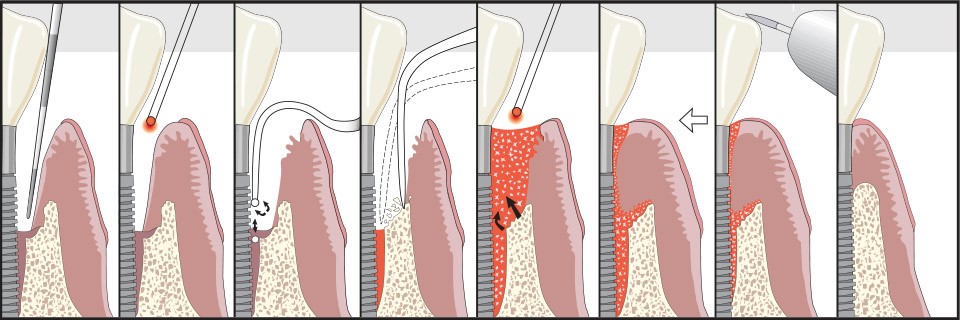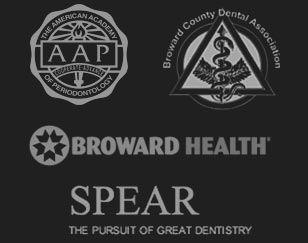Facts:
Dental Implants have a much higher rate of success when placed by a Specialist. As opposed to general dentist, a Periodontist specializes in the technique of placing implants as well as other procedures that require extensive knowledge and additional training. Moreover, Periodontist have the ability of maintaining dental implants and consequently making the implants placed last much longer.
Some dental implant brands are not well known due to their lack of research; therefore, data shows that their probability of failure is higher than a well-known reliable brand. Price is always a factor when considering the placement of implants, however, it is important to keep in mind that you’ll get what you paid for.
When a general dentist uses genetic or clone components of a dental implant (normally lower prices), the probability of failure is much higher.
If a patient is experiencing problems with an implant, chances are that a disease called Peri-Implantitis is developing.
According to a study recently published in the prestigious Journal of the American Dental Association, it explores the long-term benefits that can be seen when a general dentist recruits the services of a periodontist on your behalf for the placement of dental implants. For the purposes of the study, 922 dental implants and patients were observed for signs of success or failure three to five years after initial placement. After allowing for common causes of implant failure such as bone loss and inflammation, the researchers suggested that the survival and success rates for implants that were placed in general dental offices were lower than the statistics for implants that were placed in specialty settings such as periodontal and oral surgery offices. Your general dentist is committed to providing you with optimal tooth replacement solutions, which often includes the expertise of a seasoned dental implant provider like a periodontist. From the partnership between the two professionals, your chances for a predictable and successful implant will increase significantly. View the JADA article here.
Peri-implantitis is similar to periodontitis in natural teeth, however it occurs around a dental implant. It is characterized by the loss of bone surrounding the implant as well as inflammation and gum recession. As with traditional periodontal disease, early diagnosis is key to saving the dental implant and returning the mouth to a complete state of health.
Peri-implantitis, just like periodontal disease, develops as a result of poor oral hygiene or as a complication from certain diseases. Recent studies have also linked peri-implantitis to an increased risk for heart disease, stroke, and pancreatic cancer. Just like with traditional periodontal disease, peri-implantitis can increase your chances for serious medical conditions making it vital to seek treatment as soon as symptoms occur.
Dr. Cook treats peri-implantitis quickly and effectively with the LAPIP protocol. The LAPIP protocol helps patients save their implant investment with a less invasive, tissue sparing treatment with lasting results.
LAPIP protocol is the only patient-friendly, predictable solution for failing dental implants. Studies indicate that 95% of the failing dental implants treated with the LAPIP protocol have reintegrated in the pocket and stabilized with bone grow of 3-8 threads.
Because no resection or reflection of a vertically oriented flap is needed, the integrity of the structural tissue is retained. Thus, all other future treatment options remain.
What is the LAPIP Protocol?

- Periodontal probe indicates 5 mm or more pocket depth and radiographically there is bone loss.
- Laser vaporizes bacteria, diseased tissue, pathologic proteins, and titanium corrosion contaminants in soft tissue.
- Ultrasonic scaler tips are used to remove surface accretions.
- Bone is modified at time of surgery.
- Laser is used to form a stable fibrin blood clot containing stem cells from bone.
- Adhesion to clean surface, with a stable fibrin clot at the gingival crest to create a ‘closed system’.
- Occlusal trauma is adjusted.
- New attachment is regenerated.


